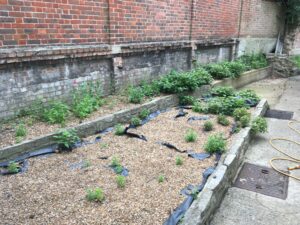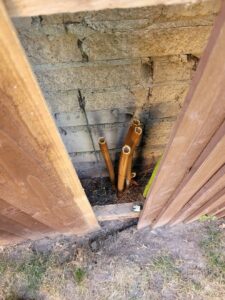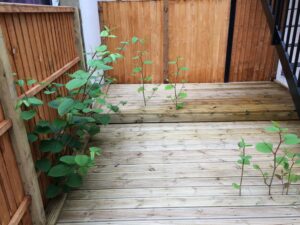One in ten property sellers would keep quiet about Japanese knotweed
One in ten property sellers would keep quiet about Japanese knotweed, according to the latest research by Environet.
Key points from research:
-
- YouGov research shows that nearly one in ten (9%) people admit they would keep quiet when selling a property with knotweed, despite the legal risks
- 3% of people have been surprised to discover Japanese knotweed in their garden after buying a property
- Sellers who fail to declare knotweed could be liable for diminution of the property’s value plus legal expenses
- It cost a seller in Raynes Park, who did not disclose the presence of knotweed, over £200,000 in damages and costs when the plant was discovered post-sale
- Two thirds (67%) of people would buy a property affected by knotweed as long as it was professionally treated and/or the price discounted – while 33% would walk away
Approximately 4,500 homebuyers in the UK could unknowingly buy a property affected by Japanese knotweed every year after sellers fail in their legal obligation to disclose it, according to new research from invasive plant specialists Environet.

Covering knotweed in plastic sheeting won’t work
The results of a new YouGov survey of over 2,000 people show that 9% of respondents admit they would say nothing when selling a property with knotweed and quietly attempt to deal with it themselves, despite the likelihood of a legal case against them when it’s discovered.
It is a legal requirement for sellers to respond honestly to the Japanese knotweed question on the TA6 form, which is completed as a standard part of the conveyancing process.
Based on approximately 1 million residential transactions that took place during 2023, with an estimated 5% of properties in the UK affected by knotweed, as many as 4,500 homebuyers could be duped into buying a home, unaware that the invasive plant is present.
Once a transaction has completed, they have little choice but to either swallow the cost of removal or treatment themselves or pursue legal action against the seller.
Of those surveyed, 3% stated they have already found themselves in the unfortunate position of discovering Japanese knotweed after they purchased a property.
The risks of non-disclosure of knotweed are high, as demonstrated last year by a seller in Raynes Park, London, who was ordered to pay £200,000 in costs and damages to the buyer of their 3-bedroom family home after they failed to declare the presence of knotweed during the sale. The seller claimed not to have known about the plant, which was located at the back of the rear garden behind the shed.
Still, the judge decreed that the knotweed had been present for several years and would have been visible during summer, making the seller liable for the resulting diminution in the property’s value and legal costs.
The survey also showed that despite 77% of people claiming to be aware of Japanese knotweed, only 12% could correctly identify it from a gallery of six photographs of different plants, including bindweed and lilac. Buyers and sellers who are unsure whether a plant could be knotweed are advised to check carefully online for pictures showing its appearance at the specific time of year, to account for seasonal changes, or commission a professional survey.

Concealment between fence and wall
Nic Seal, Founder of Environet, said:
“Discovering knotweed growing in the garden after you’ve bought a property is a very unpleasant and worrying situation to be in.
“If it can be proven that the plant was present at the time of sale, there is a very good chance of success in a legal case against the seller.
“Therefore, anyone who answers ‘No’ to the Japanese knotweed question on the TA6 form needs to be 100% certain that the property is not affected, which means no live rhizome under the ground of the property or abutting in the neighbouring land.
“That’s a difficult undertaking, so the general advice is to respond ‘Not known’.
“As the Raynes Park case shows, sellers who fail in their obligations to carry out proper checks and give false information are likely to come unstuck, as experts can usually tell how long the plant has been there and whether any attempts have been made to kill it.”
Declaring the presence of Japanese knotweed may make a property more difficult to sell, but certainly not impossible. Choosing the right course of action, 68% of sellers would be proactive and commence professional treatment, allowing their sale to proceed.

Knotweed growing through decking
Buyers are also becoming more pragmatic, with only one third (33%) stating they would not buy a property with knotweed. Five years ago, 50% would not have bought a property with knotweed.
Those who are uncertain whether a property is affected can commission a survey to check for any sign of knotweed, such as Environet’s JustCheck™ which comes with a 5-year warranty.
Even though most lenders are happy to mortgage properties affected by Japanese knotweed, 33% of buyers would still walk away, not wanting to take on the burden.
With the pool of buyers who would potentially purchase a property reduced by a third in such cases, house prices are likely to be negatively affected to some extent in the current buyer’s market.
Kindly shared by Environet UK


















